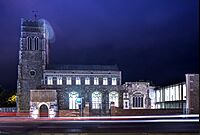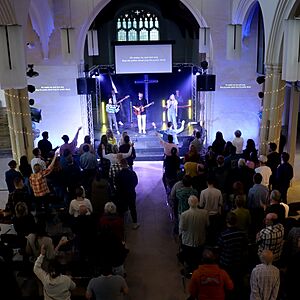St Mary-at-the-Quay Church, Ipswich facts for kids
Quick facts for kids St Mary-at-the-Quay Church, Ipswich |
|
|---|---|

St Mary-at-the-Quay Church, Key Street at Night
|
|
| Lua error in Module:Location_map at line 420: attempt to index field 'wikibase' (a nil value). | |
| OS grid reference | TM 166 442 |
| Location | Ipswich, Suffolk |
| Country | England |
| Denomination | Anglican |
| Membership | Evangelical |
| Website | River Church Churches Conservation Trust |
| Architecture | |
| Functional status | Anglican Church plant |
| Heritage designation | Grade II* |
| Designated | 19 December 1951 |
| Architectural type | Church |
| Style | Perpendicular Gothic |
| Specifications | |
| Materials | Flint with stone dressings |
St Mary-at-the-Quay Church is a very old church building in Ipswich, Suffolk, England. It used to be a church for the Anglican faith. Today, a group called the Churches Conservation Trust looks after this historic building. Since September 2021, a new church called River Church has used it. They follow a type of Christian faith called evangelicism.
This church once served the busy port area of Ipswich. Many people who worked at the docks went to this church. It stopped holding regular services in the 1950s. In 1973, the building was given to the Churches Conservation Trust. They finished a big repair project in 2016 to make sure the church stays safe.
Contents
The Church's Design and Past
This old church is on Key Street in Ipswich. It was once known as The Key Church. It was also called the Church of Our Lady Star of the Sea. This name means Stella Maris in Latin.
How the Church Was Built
The church is made from flint stones with special stone decorations. It has a main area called a nave. This nave has a row of windows high up, called a clerestory. There are also side sections, known as aisles, on both the north and south sides. The church also has parts that stick out, called transepts. At the west end, there is a tall tower.
The tower has strong supports called buttresses. These supports are decorated with a special pattern called flushwork. The top of the tower has a wall with square shapes, known as an embattled parapet. The church's building style is called Perpendicular Gothic. This was a popular style for churches long ago.
Inside the Church
Inside the church, the nave has a special ceiling called a double hammerbeam roof. This roof has carvings of the apostles. These are important figures from the Bible. You can also see carvings of important people from Ipswich's past. There are other designs too.
The church has a font from the 1400s. This font is shaped like an octagon. It was moved to another church for a while but has now been brought back. You can also see the tomb and a special metal plate, called a brass, for Henry Tooley. He built homes for people in need nearby. There is also a copy of a brass for Thomas Pounder. Like Henry Tooley, Thomas Pounder was a merchant from Ipswich. The real Thomas Pounder brass is in the Ipswich Museum.
A Look Back in Time
The St Mary's building you see today was built between about 1450 and 1550. It stands on the spot of an even older church from the 1200s. This area was the dockland area of the town. It was a busy place for merchants. St Mary's was one of twelve medieval churches in Ipswich. It was also one of three churches for sailors. Back then, it was probably known as Stella Maris.
During the 1700s, the main business of Ipswich moved away from the docks. Because of this, fewer people came to the church. Over the years, the church often flooded. This caused problems for the building. To try and stop the flooding, the underground burial areas, called vaults, were filled with concrete in the 1800s. During the Second World War, in 1940–42, bombs damaged the church. Most of its beautiful stained glass windows were lost.
Repairs and Community Use
After the war, the church stopped holding regular services. In the 1990s, a group called the Friends of Friendless Churches helped organize repairs. After that, the church was used as the main office for Ipswich's Boys' Brigade.
When the Boys' Brigade left, the church was given to the Churches Conservation Trust in 1973. By this time, most of the furniture and other items had been taken out. The Trust quickly fixed serious problems with the building. They especially worked on the flooding issues. Salt water was damaging the stone columns inside the church.
In the 2000s, the church became a place for art shows and performances. An arts group called Key Arts ran these events. In 2010, there were plans to change the church into a wellbeing center. This center would be run by Suffolk Mind. They received a large grant of £3.5 million from the Heritage Lottery Fund and other donations. After eight years of work, Mind opened the center in 2016. However, they stopped the project less than four years later. This was because the building was very expensive to keep up, and not many people used the center.
River Church Today
River Church started in 2021. It is led by Amy and Matt Key, who are leaders in the Church of England. River Church is a charismatic evangelical church. They share their faith with students from the nearby University of Suffolk.
They also run special courses called Alpha. These courses were created by leaders at Holy Trinity Brompton. They try to attract people who are not Christians by offering free food, talks, and live music. River Church also offers drinks and snacks during the week.
See also
 | DeHart Hubbard |
 | Wilma Rudolph |
 | Jesse Owens |
 | Jackie Joyner-Kersee |
 | Major Taylor |


